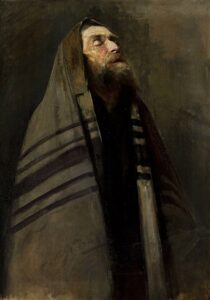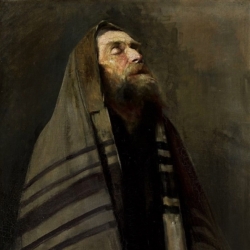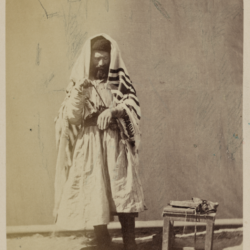In Jewish liturgy, some passages are dəvarim she-bi-qdusha, passages that require public communal prayer. Most famous among these are the Qaddish, Barkhu, and Qədusha. But people are not always able to pray in a community! In liturgical history both ancient and modern many different tashlumim (replacements) for these texts when praying individually have been suggested. The following is a replacement for the Qedushah of Shaḥarit that used to be found in many traditional Ashkenazi siddurim.
While Isaac Seligman Baer’s Seder Avodat Yisrael was used as a source, these specific replacements are also found in works as varied as the Kitsur SheLaH and the siddur of the Yaavets. (This is exceptionally ironic since the known heresy-hunter was the one who proved the Kitsur SheLaH was a Sabbatean work!) Many of the texts found here are in variant form, often a form not found elsewhere in manuscripts.
| Source (Hebrew) | Translation (English) |
|---|---|
מי שאינו יכול להתפלל עם הציבור או שאיחר לבוא לביה״כ ולא שמע קדיש או ברכו או קדושה הוא ישלים חסרונו בפסוקים וברייתות המדברות מענינים אלו, וע״פ הנוסחאות הנאות. |
One who cannot pray with the community or who is late in coming to synagogue and did not hear the Qaddish, Barkhu, or Qədushah, can make up his absence with verses and tannaitic teachings that speak of these matters, and according to the appropriate nusḥaot. |
מי שלא שמע קדישה של שחרית יאמר זה אחר תחנון׃ |
One who did not hear the Qedushah of Shaḥarit says this after Taḥanun: |
זֶה אוֹמֵר אֲנִי בִּמְקוֹם קְדוּשָּׁה שֶׁל־שַׁחֲרִית׃ |
This I am saying in place of the Qədushah of Shaḥarit! |
וְלֹ֤א תְחַלְּלוּ֙ אֶת־שֵׁ֣ם קׇדְשִׁ֔י וְנִ֨קְדַּשְׁתִּ֔י בְּת֖וֹךְ בְּנֵ֣י יִשְׂרָאֵ֑ל אֲנִ֥י יְהֹוָ֖ה מְקַדִּשְׁכֶֽם׃ (ויקרא כב:לב) |
And you will not degrade My holy name, and I will be sanctified among the children of Israel; I the Cause sanctify you. (Leviticus 22:32) |
שְׂרָפִ֨ים עֹמְדִ֤ים ׀ מִמַּ֙עַל֙ ל֔וֹ שֵׁ֧שׁ כְּנָפַ֛יִם שֵׁ֥שׁ כְּנָפַ֖יִם לְאֶחָ֑ד בִּשְׁתַּ֣יִם ׀ יְכַסֶּ֣ה פָנָ֗יו וּבִשְׁתַּ֛יִם יְכַסֶּ֥ה רַגְלָ֖יו וּבִשְׁתַּ֥יִם יְעוֹפֵֽף׃ וְקָרָ֨א זֶ֤ה אֶל־זֶה֙ וְאָמַ֔ר קָד֧וֹשׁ ׀ קָד֛וֹשׁ קָד֖וֹשׁ יְהֹוָ֣ה צְבָא֑וֹת מְלֹ֥א כׇל־הָאָ֖רֶץ כְּבוֹדֽוֹ׃ (ישעיה ו:ב-ג) |
Snake-angels standing around Them, six wings, six wings each — with two covering their face, with two covering their legs, and with two flying. And one called to another and said: “Holy, holy, holy is the Cause of Multitudes, the whole earth is full of Their glory!” (Isaiah 6:2-3) |
וַתִּשָּׂאֵ֣נִי ר֔וּחַ וָאֶשְׁמַ֣ע אַחֲרַ֔י ק֖וֹל רַ֣עַשׁ גָּד֑וֹל בָּר֥וּךְ כְּבוֹד־יְהֹוָ֖ה מִמְּקוֹמֽוֹ׃ (יחזקאל ג:יב) |
And a spirit lifted me and I heard behind me the sound of a great tumult — “Blessed be the glory of the Cause from its place!” (Ezekiel 3:12) |
יִמְלֹ֤ךְ יְהֹוָ֨ה ׀ לְעוֹלָ֗ם אֱלֹהַ֣יִךְ צִ֭יּוֹן לְדֹ֥ר וָדֹ֗ר הַֽלְﬞלוּ־יָֽהּ׃ (תהלים קמו:י) |
May the Cause reign forever! Your God, o Ẓion, from generation to generation; hallelujah! (Psalms 146:10) |
כְּשֶׁעָלָה מֹשֶׁה לַמָּרוֹם מָצָא כַּת אַחַת אוֹמֶֽרֶת קָד֧וֹשׁ ׀ קָד֛וֹשׁ קָד֖וֹשׁ יְהֹוָ֣ה צְבָא֑וֹת מְלֹ֥א כׇל־הָאָ֖רֶץ כְּבוֹדֽוֹ וְכַת אַחַת אוֹמֶֽרֶת בָּר֥וּךְ כְּבוֹד־יְהֹוָ֖ה מִמְּקוֹמֽוֹ וְכֻלָּם עוֹנִים בְּפֶה אֶחָד וְאוֹמְרִים יִמְלֹ֤ךְ יְהֹוָ֨ה ׀ לְעוֹלָ֗ם אֱלֹהַ֣יִךְ צִ֭יּוֹן לְדֹ֥ר וָדֹ֗ר הַֽלְﬞלוּ־יָֽהּ׃ |
When Moses ascended on high he found one cohort saying “Holy, holy, holy is the Cause of Multitudes, the whole earth is full of Their glory!” and another cohort saying “Blessed be the glory of the Cause from its place!” and all would respond in a unified voice and say “May the Cause reign forever! Your God, o Ẓion, from generation to generation; hallelujah!”[1] Possibly a variant form of Ḥullin 91b |
Source(s)

Notes
| 1 | Possibly a variant form of Ḥullin 91b |
|---|

“תשלומי שחרית קדושה ליחיד (אשכנז) | Replacement for the Qedushah of Shaḥarit when Praying Alone or Without a Minyan, from Seder Avodat Yisrael (1868)” is shared through the Open Siddur Project with a Creative Commons Attribution-ShareAlike 4.0 International copyleft license.





Leave a Reply